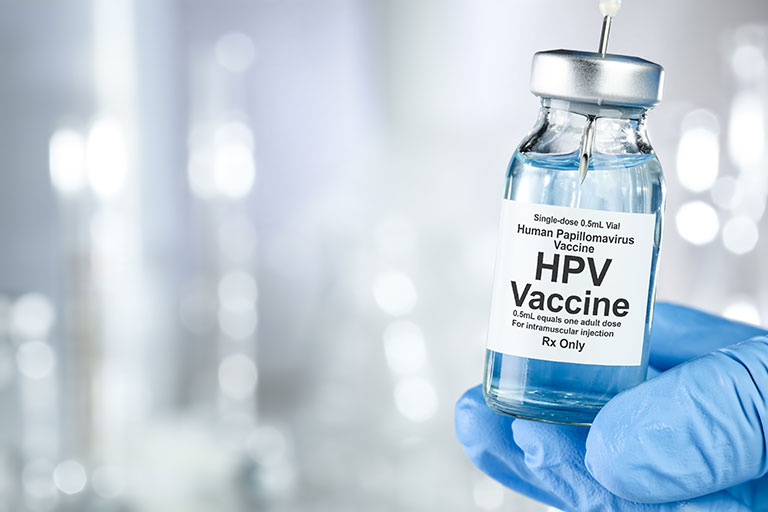Get all your doubts regarding HPV vaccination answered here!
What is HPV?
Human papillomavirus (HPV) is a virus that develops lumps or warts on the skin. The virus causes HPV infection that spreads through skin-to-skin contact. Therefore, it doesn’t require intercourse. It generally infects the throat, mouth, or genitals. It is one of the most common sexually transmitted diseases. However, in some cases, an HPV-infected mother may also transmit HPV to her child during delivery.
HPV in Women
Several women get affected by HPV in their lifetime without showing any symptoms and do not face any health-related issues. But some women may develop warts on the vulva or cervix, in the anus or vagina. Some strains of HPV develop cancer in women, such as cervical cancer, anus, throat, vagina.
HPV in Men
Most of the male population do not show any symptoms of HPV after getting infected. However, warts may develop in the genital region of some men. Moreover, genital wart strains do not cause cancer. There are different strains of HPV that causes cancer in the anal, penile, and throat of males. Additionally, men with weaker immune systems are at higher risk of HPV-related cancer.
Why Is HPV Vaccination The Best Solution?
Lifetime mutual monogamy and abstinence are the only ways to avoid genital HPV infections. There is no concrete research about barrier contraception, like condoms, protecting against HPV infection. Second, the infection is asymptomatic, except for genital warts. Even in developed countries, the susceptible female population’s adherence to routine screening through regular Pap smears has been unsatisfactory. Routine screening on a large scale is challenging in developing countries like India.
HPV Vaccine
The HPV vaccine guards against some kinds of HPV that can cause genital or cancer warts. HPV vaccines protect against two, four, or nine different forms of HPV. At least HPV types 16 and 18, which are the most common causes of cervical cancer, are protected by all HPV vaccines. HPV vaccines are expected to prevent 70 per cent of cervical cancer, 80 per cent of anal cancer, 60 per cent of vaginal cancer, 40 per cent of vulvar cancer, and more than 90 per cent of HPV-positive oropharyngeal cancers.
HPV Vaccine Types
There are three licensed vaccines for HPV in India – Gardasil (by Merck), Cervarix (by Glaxo Smith Kline), and Gardasil 9 (non-valent vaccine). Recombinant DNA technology creates non-infectious VLPs containing the HPV L1 protein in both vaccinations. Both the vaccines are equally effective and safe against precancerous lesions and cervical cancer. These vaccines are approved by European Medicines Agency, US FDA (Food and Drug Administration), Drug Controller General of India (DCGI) and prequalified by the WHO (World Health Organization).
Gardasil is a quadrivalent vaccine, i.e., it protects against four strains of HPV. This vaccine gives protection against both genital warts and cervical cancer.
Cervarix is a bivalent vaccine, i.e., it gives protection against two different HPV strains. This vaccine gives protection against cervical cancer only.
Gardasil 9 is a non-valent vaccine that was licensed in 2018 in India. It protects against the following:
• Kinds 16 and 18 of the HPV are the two types responsible for 80% of cervical cancer incidences.
• HPV strains 6 and 11 cause ninety per cent of genital warts.
• HPV types 31, 33, 45, 52, and 58 can cause cancer of the cervix, anus, vulva/vagina, penis, or throat.
Scheduling HPV Vaccine
Vaccination should begin when a child is 9–12 years old. If one has missed immunisation at an early age, then they can opt for catch-up vaccination which is allowed till 26 years. With Gardasil, three doses at 0, 2, and 6 months are suggested; with Cervarix, three doses at 0, 1, and 6 months are recommended (minimum four weeks interval between the first two doses, followed by 12 weeks between the second and third dose). HPV vaccines can be given simultaneously as other vaccines like Hepatitis B and Tdap. People above the age of 26 years cannot take HPV immunisation.
Dosage
The vaccine is injected intramuscularly in the anterolateral thigh or the deltoid muscle in a dose of 0.5 mL. It comes as a sterile injection suspension in a single-dose vial or a prefilled string. The latter must be shaken well before use.
Side-Effects
Generally, HPV vaccines have mild side effects like pain, fever and swelling with the erythema. There are no reported severe side effects of the vaccine. People who are hypersensitive to yeast or any vaccine component should avoid the vaccinations. Pregnant women should avoid it as well. In India, these vaccines are not recommended for males.
Conclusion
Awareness of HPV infection and vaccination are necessary steps to prevent cervical cancers. Researchers have found that 85% of people will get HPV infection once. It, along with other factors, can then develop into cervical cancer. Studies suggest that HPV vaccination lowers the risk of cervical cancer by 62% in women aged 14 to 16 and 34% in the case of the 16-18 age group. This data suggest that vaccination is quite effective and can prevent the potential threat. Furthermore, prevention is better than cure; therefore, opting for HPV vaccinations is an intelligent choice.

